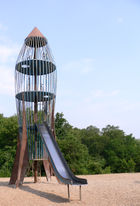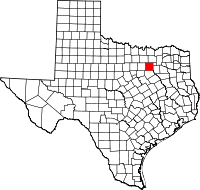Richardson, Texas
| Richardson, Texas | |||
|---|---|---|---|
| — City — | |||
|
|||
| Nickname(s): The Telecom Corridor | |||
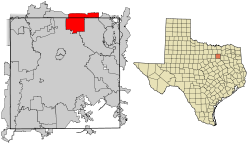 |
|||
| Coordinates: | |||
| Country | |||
| State | |||
| Counties | Dallas, Collin | ||
| Government | |||
| - Type | Council-Manager | ||
| - City Council | Mayor Gary Slagel Bob Townsend Mark Solomon John Murphy Bob Macy Steve Mitchell Amir Omar |
||
| - City Manager | Bill Keffler | ||
| Area | |||
| - City | 28.6 sq mi (74.0 km2) | ||
| - Land | 28.6 sq mi (74.0 km2) | ||
| - Water | 0.0 sq mi (0.0 km2) | ||
| Elevation | 630 ft (192 m) | ||
| Population (2007) | |||
| - City | 101,400 | ||
| - Density | 3,549.1/sq mi (1,370.3/km2) | ||
| - Metro | 6,145,037 | ||
| Time zone | CST (UTC-6) | ||
| - Summer (DST) | CDT (UTC-5) | ||
| Area code(s) | 972 | ||
| FIPS code | 48-61796[1] | ||
| GNIS feature ID | 1345172[2] | ||
| Website | http://www.cor.net | ||
Richardson is a city in Dallas and Collin Counties in the U.S. state of Texas[3]. As of the 2000 census, the city had a total population of 91,803, while according to a 2007 estimate, the population had grown to 101,400.[4] Richardson is an affluent inner suburb of Dallas and home of the Telecom Corridor with a high concentration of telecommunications companies. More than 5,000 businesses have operations within Richardson's 28 square miles, including five of the world's largest communications/networking companies: AT&T, Cisco Systems, Samsung, Fujitsu and Nortel.[5]
In 2006, Richardson was ranked as the 15th best place to live in the United States by Money magazine. This ranked Richardson the 3rd best place to live in Texas.[6]
In 2007, the Morgan Quitno 14th Annual America's Safest and Most Dangerous Cities Awards pronounced Richardson the 69th safest city in America. In the same study Richardson ranked the 5th safest city in Texas.[7]
In 2008, Richardson was ranked as the 18th best place to live in the United States by Money magazine. This ranked Richardson the 4th best place to live in Texas.[8]
In 2009, Business Week's annual report on the "Best Places to Raise Kids," ranked Richardson 2nd in Texas.[9]
Richardson was the first North Texas city recognized as a best workplace for commuters by the EPA and the Department of Transportation in 2004. As of 2010 the city has continued to be recognized every year since 2004.[10]
Contents |
History
Early Years
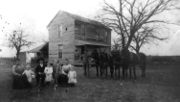
In the 1840s, settlers from Tennessee and Kentucky began arriving in the Richardson area which was inhabited by Comanche and Caddo Native American tribes. Several of the earliest families clustered around an area later named Breckinridge in honor of John C. Breckenridge, Confederate Secretary of State and General, and Vice President of the United States from 1857–1861. The town was situated near what is now Richland College and consisted of a general store, a blacksmith shop and the Floyd Inn.
After the American Civil War, the new railroad bypassed Breckinridge and an area to the northwest of Breckinridge became the new center of activity. William J. Wheeler donated land for the town site and railroad right-of-way, but declined to have the village named in his honor. Instead the town was named for railroad contractor E. H. Richardson, who built the line from Dallas to Denison.
Richardson was chartered in 1873. Originally, there were three businesses: a general store, a post office and a drug store. In 1908 the Interurban, an electric railway, began service north to Denison, Texas, south to Waco, Texas, southeast to Corsicana, Texas and west to Fort Worth, Texas. By 1910, residents had seen their first telephone, electric light and gravel street, and had grown in number to about 600. In 1914, a red brick schoolhouse, presently home to the administrative offices of the Richardson Independent School District (RISD), was built.
Major Growth Period
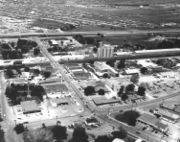
In 1924, the Red Brick Road (Greenville Avenue) was completed, bringing an increase in traffic, population and property values. The following year the town incorporated and elected its first mayor, Thomas F. McKamy. All taxable property was assessed at a value of $515,292, and a total of 15 businesses were in operation. Bonds were issued and in 1926, waterworks were completed so homes could be furnished with indoor water. A sewage treatment plant was then constructed, the volunteer fire department began operating and, soon after, utility franchises were awarded to Lone Star Gas and Texas Power and Light Company. By 1940, the population stood at about 740 but after World War II, the city experienced a new surge in population. By 1950, the city boasted a population of approximately 1,300. Additional municipal services, such as emergency ambulance, police protection and parks and recreation facilities, became available to residents.
In 1951, Collins Radio opened a Richardson office, ushering the city into the electronic era. U.S. Highway 75 opened in 1954 and the agricultural city of the past became a community of shopping centers and homes. In 1955, Richardson’s first police department was organized; consisting of a chief and two officers. On June 23, 1956, voters voted in favor of adopting a home rule charter and a council-manager form of government that still operates today.[15] Door-to-door mail delivery became available to the 5,000 residents and funds were approved for a park and city hall. Also in 1956, Texas Instruments opened its offices just south of the Richardson border and land values increased dramatically as the city made significant advances in population and economic status. More than 500,000 people moved into the Dallas area in the period between 1940 and 1960.
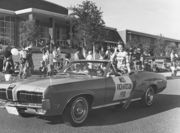
In 1969, Erik Jonsson and other Texas Instruments executives donated the Southwest Center for Advanced Studies to the state and it became part of the University of Texas System called University of Texas at Dallas. In 1972, the population stood at approximately 56,000, and this same year the Richardson Independent School District had an enrollment of approximately 32,000 students in 16 elementary schools, seven junior high schools and four high schools.
The city is no longer the bedroom community of the 1950s and 1960s, but is itself home to a significant employment center, the Telecom Corridor, where more than 80,000 people work each day. The city is currently experiencing a second major growth period with wide spread New Urbanism development and revitalization.
Recent History
On January 8, 1991, Richardson High School student Jeremy Wade Delle fatally shot himself in front of his English class, an incident that inspired the Pearl Jam song "Jeremy".
The city of Buckingham, after being completely surrounded by Richardson, was annexed into the city in 1996.
The Dallas Area Rapid Transit (DART) completed construction on three light rail stations for the city in the late 1990s. In 2002 a fourth DART station and the Eisemann Center for Performing Arts and Corporate Presentations opened in the Galatyn Park Station urban center.
Richardson was a "dry city" with no alcohol sales until November 2006, when the local option election passed to allow the sale of beer and wine only. A notable exception is the affluent former city of Buckingham, which was annexed by Richardson in 1996. Because Buckingham allowed the sale of all alcohol, including liquor, prior to its annexation, such sales were allowed to continue.
Richardson City Council members unanimously approved a smoking ban on May 12, 2008. The smoking ordinance went into effect January 1, 2009. Smoking is prohibited in work places, restaurants, bowling alleys, bingo parlors, public parks, at outdoor special events, and within 25 feet of any door, operable window, vent or other openings to an indoor enclosed area. Exceptions to the smoking ban include private residences, retail tobacco stores with 90 percent or more of gross revenue derived from tobacco products, unenclosed patios associated with a restaurant or bar, bars that derive 70 percent or more of gross revenue from the sale of alcohol. Bars that derive 50 to 70 percent of gross revenue from the sale of alcohol are also exempt as long as they build a separate smoking room not open to any other establishment or area where smoking is prohibited. All businesses that are smoke free or allow smoking are required to post signs, designed by the city, which inform patrons of their smoking status.[16] Council member John Murphy was quoted in The Dallas Morning News saying "I cannot remember a more potentially divisive issue to come before this council,".
Richardson received local media attention for removing its Rocket Slide and other Space Age and Cold War Era playground equipment from Heights Park in July 2008.[12][13][14]
In the fall of 2008 Peter Perfect, a Style Network television show came to Richardson. The business-makeover show remodeled SpiritWear an apparel and embroidery store located in the city's historic downtown area. The episode first aired on January 22, 2009. In addition to the store makeover the women that run the store received personal makeovers. It was the first episode of the series to be filmed outside of California.[17]
In an April 2009 interview, Mike Judge said that he modeled Arlen, the setting for King of the Hill, after Richardson.[18]
Geography
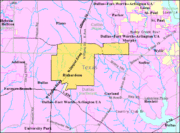
Dallas and Plano border most of Richardson with a few exceptions. North East Dallas(Lake Highlands) borders the south, North Dallas borders the southwest, Far North Dallas borders the west, West Plano borders the northwest, East Plano borders the north, Murphy borders the northeast, Sachse borders the east and Garland borders the southeast.
Richardson is located at .[19]
According to the United States Census Bureau, the city has a total area of 28.6 square miles (74.0 km2), all of it land.
Most of the city is in Dallas County, however the northernmost part of the city is in Collin County. Of the 27.4 square miles (71 km2) contained within the borders of the City of Richardson, 18.2 sq mi (47 km2). lie in Dallas County; the other 9.2 sq mi (24 km2). fall in Collin County.
Climate
Richardson's considered to be part of the humid subtropical area.
Government
Government Form
Voters approved a home rule charter in 1956 establishing a Council/Manager form of government. The Council/Manager form of government is the system of local government that combines the strong political leadership of elected officials in the form of a council, with the managerial experience of an appointed local government manager. A representative system of government is established where all power is concentrated in the elected council and where the council hires a professionally trained manager to oversee the delivery of public services.
Elections
Members of the City Council[20] are elected for two-year terms on a nonpartisan basis. The Council is made up of seven members:one resident from each of the City’s four quadrants and three others at large. All seven members are elected by the entire city. Once elected, council members choose the Mayor and Mayor Pro Tem from among the elected members.
Responsibilities
Council members are responsible for hiring the City Manager, appointing the City Attorney, City Secretary, Municipal Court Judges, City Health Officer and citizens to the City’s boards and commissions. The Council is also responsible for passing City ordinances, planning for capital improvements, issuing and selling municipal bonds, purchasing and selling property, establishing City departments, determining City services, approving the annual budget, and setting the City’s tax rate. The City Manager is responsible for the City’s daily operations, hiring department heads, supervising the City personnel, directing and coordinating all municipal programs, enforcing all municipal laws and ordinances, and recommending an annual budget.
Meetings
The City Council holds business meetings on the second and fourth Monday of each month at 7:30 p.m. in the Council Chambers at City Hall. Work sessions are held every Monday at 6:00 p.m. in the Richardson Room[21] at City Hall. Citizens are welcome to attend Council meetings and may speak during the visitor’s section. Citizens also may attend work sessions and speak to the Council during the visitor's section (promptly at 6 p.m.) on weeks when there is not a business meeting at 7:30 p.m. The City of Richardson makes City Council meetings available on-line via streaming video and cable TV. The City has little formal content online describing how the City Council and government operate, but the Richardson Echo (a local media website) has published online McCalpin's Unofficial Guide to Richardson City Council Meetings which explains in detail how Council meetings and worksessions operate, along with descriptions and links to the online content that is available from the City.
Economy & Development
Despite declining economies in other parts of the United States, from 2005 through 2009 Richardson has had substantial increases in its economy. The city’s total assessed property value went up from $8.3 billion in 2005 to $9.5 billion 2008. Sales tax collection went up from $21 million in 2005 to an estimated $24.7 million in 2008. The city has also achieved a considerable amount of corporate recruitment and retention. Including the new Blue Cross Blue Shield development, the largest DFW office campus development since 1987 is a 15 story, 1,000,000-square-foot (93,000 m2) regional headquarters, where 2,700 employees work. Credit Solutions, the largest for-profit debt management company in the United States, has moved into a 282,000-square-foot (26,200 m2) building in Galatyn Park. Some other major corporate expansions or relocations include Countrywide Financial, MetroPCS, Yahoo, Huawei Technologies, Fujitsu and Halff Associates. Data centers continue to be a redevelopment interest in Richardson as well.[22]
As a sign of the evolution in the "Telecom Corridor" from high tech wireless/telco to a broader range of industries, one of the early wireless companies, Ericsson, sold its former U.S. headquarters in Richardson in 2002 to an investment partnership headed by Skyrise Properties Inc.[23]
In 2009 AT&T signed a 10-year lease on more than 200,000 square feet of space - all of the seven-story building at 2270 Lakeside Blvd. just east of US-75.[24]
The city has experienced a surge of mixed-use development, suburban infill and transit-oriented development, predominantly on the city's eastern side. The Venue is a 4-acre (16,000 m2) mixed-use development adjacent to Galatyn Park, a DART rail station. Eastside, a mixed-use, infill development, is at the midpoint of two rail stations, Araphaho Center and Galatyn Park. Eastside is located on the southeast corner of Campbell Road and US 75. It features 450 apartments by Post Properties, 90,000 square feet (8,400 m2) of retail space and 35,000 square feet (3,300 m2) of office space in addition to a class A office building that was pre-existing on the development site. Eastside phase II will include 12 acres (49,000 m2) of office and mixed-use development. Brick Row, a $200 million mixed-use development, is located on the northwest corner of Spring Valley Road and Greenville Avenue, less than half of a mile east of US 75. Brick Row borders the Spring Valley Station. The Shire is a mixed-use center of 6.5 acres (26,000 m2). Phase II is an additional 10 acres (40,000 m2). The Shire has a boutique hotel planned and features 62 luxury condominiums. The former Richardson Square Mall has been redeveloped into an outdoor retail center. Other retail centers have been re-developed or remodeled including Buckingham Plaza, Buckingham Square, Dal-Rich Village, Richardson Village, II Creeks, Richardson Heights and Richardson Village.[25]
Criterion Property Company LP is building a 360-unit resort-style multi-family project on Richardson’s 190 Corridor at Custer Parkway. The 14-building development to be called, Pradera, is just south of 190/Bush Turnpike and lies adjacent to the 62-acre (250,000 m2) proposed 190/Hall Office Park, a Class A office development that eventually will have over 1 million SF of office buildings.[26]
This city has won many economic awards including DBJ’s 2006 “Best Real Estate Deal of the Year”, International Economic Development Council's 2006 "Technology-Based Economic Development Award", and Texas Economic Development Council's 2007 "Texas Economic Excellence Award".[27]
In 2008 Standard & Poor's upgraded Richardson's credit rating to “AAA” from the previous rating of “AA+”. At the time, the City of Richardson was one of only four cities in the state of Texas and one of 88 cities in the nation with an “AAA” rating from Standard & Poor’s. Richardson is the metropolitan statistical area’s second largest employment center with daytime population increasing to more than 140,000. The economy remains rooted in the telecommunications industry. However, Richardson’s property tax base is deep and extends beyond its Telecom Corridor area with other sectors including health care, technology, and finance. The City’s per capita sales are 200 percent of the national average as well as the second highest sales tax per capita in the Dallas Fort Worth Metroplex. The tax base is very diverse with the 10 leading taxpayers accounting for 10 percent of total assessed value.[28]
Corporate headquarters
Bennigan's,[29] MetroPCS,[30] and Wingstop Restaurants have their headquarters in Richardson.[31]
Major employers
According to the Richardson Economic Development Partnership's listing on Major Employers (last updated December 2009),[32] the top employers in the city are:
| # | Employer | # of Employees |
|---|---|---|
| 1 | Richardson Independent School District | 4,780 |
| 2 | AT&T Inc. | 4,000 |
| 3 | Blue Cross & Blue Shield of Texas | 3,100 |
| 4 | Bank of America | 3,000 |
| 5 | The University of Texas at Dallas | 2,830 |
| 6 | Verizon Business | 2,250 |
| 7 | Nortel Networks (now Avaya) | 1,500 |
| 8 | Fujitsu Network Communications | 1,500 |
| 9 | Rockwell Collins | 1,200 |
| 10 | Cisco Systems | 1,200 |
as well as [33]
|
|
Demographics
As of the census[1] of 2000, there were 91,802 people, 35,191 households, and 24,774 families residing in the city. The population density was 3,213.9 people per square mile (1,241.1/km2). There were 36,530 housing units at an average density of 1,278.9/sq mi (493.8/km2). The racial makeup of the city was 75.39% White, 11.67% Asian, 6.18% African American, 0.45% Native American, 0.06% Pacific Islander, 3.65% from other races, and 2.60% from two or more races. Hispanic or Latino of any race were 10.26% of the population.
There were 35,191 households out of which 33.7% had children under the age of 18 living with them, 58.1% were married couples living together, 8.9% had a female householder with no husband present, and 29.6% were non-families. 22.9% of all households were made up of individuals and 5.5% had someone living alone who was 65 years of age or older. The average household size was 2.59 and the average family size was 3.07.
In the city the population was spread out with 24.8% under the age of 18, 8.7% from 18 to 24, 32.7% from 25 to 44, 23.9% from 45 to 64, and 10.0% who were 65 years of age or older. The median age was 36 years. For every 100 females there were 97.6 males. For every 100 females age 18 and over, there were 95.2 males.
In the 2000 census Males had a median income of $52,381 versus $35,255 for females. The per capita income for the city was $29,551. About 3.3% of families and 6.3% of the population were below the poverty line, including 6.4% of those under age 18 and 3.4% of those age 65 or over.
According to a 2008 estimate, the median income for a family in Richardson was $90,790 with a median home price was $195,510.[34]
Education
Colleges and universities
The University of Texas at Dallas, often called UT Dallas or UTD, is part of the University of Texas System. Despite its name, UT Dallas is located at 800 West Campbell Road in Richardson. The campus does have one building located in the city limits of Dallas. Richardson police and fire cover this building through an agreement between Richardson, Dallas, and UTD.[35] The main campus is sited with Campbell Road on the south, Floyd Road on the east, Waterview on the west, and Synergy Park Boulevard on the north, with the school owning additional largely vacant land between Synergy and the President George Bush Turnpike. The main entrance to the campus is on the south side at Campbell Road and West Shore Drive.
Richland College is a community college that is part of the Dallas County Community College District or DCCCD. The college is in Dallas on the Richardson border. It is the largest school in the DCCCD, featuring nearly 14,000 students. In 2005, Richland became the first community college to receive the Malcolm Baldrige National Quality Award.[36]
Primary and secondary schools
Public schools
The city is served by the Richardson Independent School District (RISD), except for the portion of the city in Collin County, which is served by the Plano Independent School District (PISD).
Twenty-one RISD schools have officially been named to the Texas Business and Education Coalition's (TBEC) Honor Roll for 2008, the second consecutive year RISD has lead the state of Texas in Honor Roll Campuses. The TBEC Honor Roll is the most prestigious award for sustained, academic excellence in Texas. It recognizes schools that have demonstrated three years of consistent, high performance in all subjects compared to other schools serving similar student populations. Of the more than 8,000 Texas public schools less than 4% make the TBEC Honor Roll, while in RISD, 40% of eligible campuses are Honor Roll Schools for 2008.[37]
The RISD and PISD have many Blue Ribbon Schools.[38] [39] [40] [41] The Blue Ribbon Schools Program is a United States government program created to honor schools. The Blue Ribbon award is considered to be the highest honor that an American school can achieve.
Zoned RISD high schools in Richardson include Richardson High School,[42] Lloyd V. Berkner High School,[43] and J.J. Pearce High School.[44] The Christa McAuliffe Learning Center and the RISD alternative school, are also in Richardson.[45] Lake Highlands High School is part of the Richardson Independent School District but is located in Lake Highlands, an area in Dallas, Texas, just south of Richardson.
Sections of Richardson in the Plano Independent School District are served by several schools. Aldridge, Miller, Schell, and Stinson elementary schools are within Richardson and serve Collin County portions of Richardson.[46][47] A section of Collin County Richardson is zoned to Mendenhall Elementary School in Plano.[48] Armstrong, Bowman, and Wilson middle schools in Plano and Murphy Middle School in Murphy serve separate sections of Collin County Richardson. Vines High School and Williams High School, 9-10 schools in Plano, serve separate sections of Collin County Richardson. Plano Senior High School and Plano East Senior High School serve separate sections of Collin County Richardson.[46][48] Prior to 2007 a section was zoned to Boggess Elementary School in Murphy.[49]
Private schools
The Roman Catholic Diocese of Dallas operates two K-8 schools, St. Joseph School and St. Paul the Apostle School, in Richardson.[50] Other private schools include Canyon Creek Christian Academy (K-12), North Dallas Adventist Academy (K-12), IANT Quranic Academy (K-12), The Alexander School (8-12), and Dallas North Montessori School (ages 3–9).
Public libraries
The Richardson Public Library is located at 900 Civic Center Drive in the southwest corner of U.S. Route 75 (North Central Expressway) and Arapaho Road.[51]
The roots of the Richardson Public Library date back to 1947 when a branch of the Dallas County Library was established in a section of the Cash Dry Goods store on East Main Street in downtown Richardson. The fledgling library collection numbered about 400 volumes and was managed by Jessie Durham the store's proprietor. The City Council established the library as a city department in 1958 and in 1959 the library moved into a newly constructed building at 310 Tyler Street. This new library was just under 6,000 square feet (560 m2) in size and was build at a cost of $100,000.[52]
Richardson was experiencing rapid growth in the 1960s and 70s and the library facility soon became inadequate for community needs. The current facility was constructed at a cost of $2 million and opened December 1, 1970. The new 81,650 square foot, four-story building opened with the use of two floors and a small portion of a third.[53] The basement was finished in 1980 for the reference collection and services. 1995 saw another expansion which finished the upper floor and renovated the three previously opened floors. Another renovation occurred in 2006 when the Youth Services department was expanded and other collections and services rearranged.[52]
In 2008 the Library set a new record for the number of items circulated in a fiscal year when the 1 millionth item was checked out in the fall of 2008. The building has undergone building renovations and technological improvements in recent years that enhance the library experience for patrons. The Texas Municipal League recognized the Library with its "Achievement of Excellence in Libraries" award every year from 2004 to 2008. Hennen's American Public Library Rating publication has ranked the library second in the state of Texas every year from 2005 to 2008.[54]
Transportation
Richardson’s strategic location with major area highways provides convenient access for workers commuting into Richardson, the second largest employment center in the DFW Metroplex. U.S. Highway 75 (North Central Expressway) bisects the city from south to north. Texas State Highway 190 (President George Bush Turnpike) borders the north and Interstate 635 (Lyndon B. Johnson Freeway) borders the south. The city has more Dallas Area Rapid Transit (DART) rail stations than any other Dallas area suburb. The stations from south to north are the Spring Valley Station, Arapaho Center Station, Galatyn Park Station and the Bush Turnpike Station. Three of the rail stations have free parking for people who wish to park and ride. The four stations are strategically located for commuters working and residing in close proximity to the Telecom Corridor area. Feeder buses ensure commuters reach their destination safely. DART bus service is available throughout the city.[55] The city's Walk Score is 85 out of 100 or Very Walkable.[56]
Major Highways
 Interstate 635 - (Lyndon B. Johnson Freeway)
Interstate 635 - (Lyndon B. Johnson Freeway) U.S. Highway 75 - (North Central Expressway)
U.S. Highway 75 - (North Central Expressway) State Highway 190 - (President George Bush Turnpike) (toll)
State Highway 190 - (President George Bush Turnpike) (toll)
Light rail
- DART: Red Line
- Spring Valley Station
- Arapaho Center Station
- Galatyn Park Station
- Bush Turnpike Station
Mayors
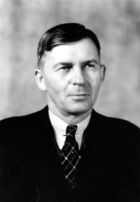
- 1925–1927: T. F. McKamy[11]
- 1927–1929: W. S. Spotts
- 1929–1931: Kit Floyd
- 1931–1933: James Harben
- 1933–1937: T. F. McKamy
- 1937–1947: T. J. Jackson
- 1947–1951: Elmer Dabney
- 1951–1953: Dr. T. C. Longnecker
- 1953–1955: A. W. Walvoord
- 1955–1959: R. V. Thompson
- 1959–1961: Glen Hoskins
- 1961–1963: W. B. Strange
- 1963–1967: Herb Ryan
- 1967–1967: Robert Porter
- 1967–1968: John Gordon
- 1968–1983: Ray Noah[57]
- 1983–1986: Martha Ritter[58]
- 1987–1991: Charles Spann[59]
- 1991–2007: Gary Slagel[60]
- 2007–2009: Steve Mitchell[61]
- 2009–present: Gary Slagel[62]
Notable Richardsonians
|
|
Images
Historic Richardson
 The Campbell Family property, circa 1870 |
 The Floyd Family Inn in Breckinridge, circa 1880 |
 Drug Store on Main Street, circa 1900 |
 Barber Shop on Main Street, circa 1920 |
 Main Street (now Belt Line Road), 1890 |
 Main Street, 1910 |
 Main Street, 1923 |
 Main Street, 1950 |
 Master Downtown Street Plan, 1878 |
 Richardson High School Class of 1917 |
 Richardson High School Football Team, 1919 |
 R. P. Harben Drug Store, circa 1900 |
 Richardson Telephone Exchange, circa 1910 |
 Richardson Telephone Exchange, circa 1916 |
 Richardson Telephone Exchange operator, circa 1900 |
 Richardson Interurban Depot, 1908 |
Photographs courtesy of the Richardson Historical and Genealogical Society.
See also the University of North Texas' Portal To Texas History
Richardson Today
 Heights Park, famous for its rocketship slide. |
 A January Saturday afternoon in Heights Park. |
 Richardson's Asian market area. |
 Richardson's Historic Downtown - Main Street, heading east from Central Expressway. |
 The Como Motel, Richardson's oldest working motel. |
 Lobby of Richardson Public Library |
 Building in Richardson business district |
 Charles W. Eisemann Center for Performing Arts |
Bibliography
- Braithwaite, Barbara (editor). A History Of Richardson. Richardson, Texas: Richardson Centennial Corporation, 1973.
- Gillespie, Gwyn. Historic Richardson: An Illustrated History. San Antonio, Texas: Historical Publishing Network, 2002.
- Harris, Janet (editor). And The Telling Takes Us Back: An Oral History of Richardson. Richardson, Texas: University of Texas at Dallas Center for Continuing Education, c1984-85. (Note: Part 1 consists of 21 interviews with representatives of families who settled in and helped in the development of the city. It covers the time period of early settlement to 1940. Part 2 begins with 1940 and continues to 1985.)
 |
Plano | Plano | Murphy |  |
| Dallas | Sachse | |||
| Dallas | Dallas | Garland |
References
- ↑ 1.0 1.1 "American FactFinder". United States Census Bureau. http://factfinder.census.gov. Retrieved 2008-01-31.
- ↑ "US Board on Geographic Names". United States Geological Survey. 2007-10-25. http://geonames.usgs.gov. Retrieved 2008-01-31.
- ↑ By area, 66% of Richardson is in Dallas County, but by registered voters, about 74% of the population is in Dallas County
- ↑ CNN. http://money.cnn.com/magazines/moneymag/bplive/2007/snapshots/PL4861796.html.
- ↑ Intro.
- ↑ "MONEY Magazine: Best places to live 2006: Top 100 1-25". CNN. http://money.cnn.com/magazines/moneymag/bplive/2006/top100/index.html.
- ↑ Richardson Today, Vol. 20 No. 4, January 2008, Page 4
- ↑ MONEY Magazine: Best places to live 2008: Top 100 1-25
- ↑ BusinessWeek: Best Place to Raise Kids
- ↑ http://www.cor.net/GreenInitiative.aspx?id=6210
- ↑ 11.0 11.1 City's Website, Historical
- ↑ 12.0 12.1 Residents reminisce as rocket ship removed from playground
- ↑ 13.0 13.1 One of Richardson’s Most Recognizable Landmarks to disappear the week of July 14
- ↑ 14.0 14.1 From Such Great Heights to New Lows, the Dismantling of Richardson's Historic 'Rocket Ship' Park
- ↑ The election was certified on June 26, 1956. Source, Open Records Request for 1987/1988 Charter Review Commission notes, by William J. 'Bill' McCalpin, on January 26, 2010.
- ↑ Richardson Today, Vol. 21 No. 4, January 2009
- ↑ DFW.com, SpiritWear, TV makeover
- ↑ Shattuck, Kathryn (April 26, 2009). "It Was Good to Be ‘King,’ but What Now?". The New York Times. http://www.nytimes.com/2009/04/26/arts/television/26shat.html?_r=1/. Retrieved July 29, 2010.
- ↑ "US Gazetteer files: 2000 and 1990". United States Census Bureau. 2005-05-03. http://www.census.gov/geo/www/gazetteer/gazette.html. Retrieved 2008-01-31.
- ↑ Government
- ↑ See City Hall location and layout at
- ↑ State of the city 2008
- ↑ Brown, Steve. "Article: Ericsson Sells Its Former U.S. Headquarters in Richardson, Texas" The Dallas Morning News. January 4, 2002. Retrieved on January 18, 2010.
- ↑ AT&T deal
- ↑ State of the city 2008
- ↑ Criterion Building Resort-Style Project
- ↑ Richardson, Texas Economic Development Partnership
- ↑ Richardson Today, Vol. 20 No. 8, June 2008
- ↑ "Contact." Bennigan's. Retrieved on February 21, 2010.
- ↑ "FAQs." MetroPCS. Retrieved on March 17, 2010.
- ↑ "Contact Us." Wingstop. Retrieved on February 21, 2010.
- ↑ REDP list of Major Employers Retrieved 2010-01-04
- ↑ Major Employers
- ↑ "MONEY Magazine: Best places to live 2008: Richardson, TX snapshot". CNN. http://money.cnn.com/magazines/moneymag/bplive/2008/snapshots/PL4861796.html.
- ↑ [1]
- ↑ "2005 Award Winner." National Institute of Standards and Technology. Retrieved on January 19, 2008.
- ↑ "21 Richardson ISD Campuses Make TBEC Honor Roll For 2008 Most in Texas Again." City of Richardson. Fall 2008. Retrieved on February 7, 2009.
- ↑ "Blue Ribbon Schools 1982-2002
- ↑ "Blue Ribbon Schools 2003-2006
- ↑ "Blue Ribbon Schools 2007
- ↑ "Blue Ribbon Schools 2008
- ↑ "inter003RichardsonHS.jpg." Richardson Independent School District. Retrieved on February 7, 2009.
- ↑ "inter005Berkner.jpg." Richardson Independent School District. Retrieved on February 7, 2009.
- ↑ "inter004Pearce.jpg." Richardson Independent School District. Retrieved on February 7, 2009.
- ↑ "Christa McAuliffe Learning Center." Richardson Independent School District. Retrieved on February 6, 2009.
- ↑ 46.0 46.1 "Plano Senior HS Feeder Schools." Plano Independent School District. Retrieved on February 8, 2009.
- ↑ "SchellBoundaryMap.pdf." Plano Independent School District. Retrieved on February 8, 2009.
- ↑ 48.0 48.1 "Plano East Senior HS Feeder Schools." Plano Independent School District. Retrieved on February 8, 2009.
- ↑ "Board Agenda - November 07, 2006." Plano Independent School District. Retrieved on February 8, 2009.
- ↑ "Catholic Elementary Schools and Principals." Roman Catholic Diocese of Dallas. Retrieved on February 7, 2009.
- ↑ "Library Location." City of Richardson. Retrieved on February 7, 2009.
- ↑ 52.0 52.1 Library History
- ↑ http://www.cor.net/LibraryFAQ.aspx?id=5228
- ↑ Record-setting year for award-winning Library." Richardson Today. Vol. 21 No. 4. January 2009. 1. Retrieved on February 7, 2009.
- ↑ Transportation
- ↑ Walkable Score
- ↑ "[2]
- ↑ "[3]
- ↑ "[4]
- ↑ "[5]
- ↑ "[6]
- ↑ "[7]
- ↑ "Jensen Ackles to Join Phillips for TX A Few Good Men." Broadway World. Saturday April 28, 2007. Retrieved on February 6, 2009.
- ↑ "Richardson Pearce's Agoos, Fawcett elected to the Hall of Fame." Associated Press at WFAA-TV. Friday January 16, 2009. Retrieved on February 6, 2009.
- ↑ "[8]
- ↑ "[9]
- ↑ 67.00 67.01 67.02 67.03 67.04 67.05 67.06 67.07 67.08 67.09 67.10 "[10]
- ↑ "[11]
- ↑ http://www.tshaonline.org/handbook/online/articles/GG/fgaah.html John Gary in Texas Handbook Online
- ↑ "[12]
- ↑ "[13]
- ↑ http://news.google.com/newspapers?id=m6gQAAAAIBAJ&sjid=iJYDAAAAIBAJ&dq=richardson-texas&pg=6851%2C400593 Widow of Assassin Remarries
- ↑ http://www.richardsonecho.com/News/ReadArticle/tabid/82/articleType/ArticleView/articleId/57/Default.aspx Author Anne Rice, former Richardson resident, writes to the Richardson Echo
- ↑ Christensen, Thor. "Ashlee Simpson finds a high note in every low point of her career." WFAA-TV. Friday June 16, 2006. Retrieved on February 6, 2009.
- ↑ Wilonsky, Robert. "Jessica and Zayra: Not Quite Good Enough." Dallas Observer. Tuesday October 10, 2006. Retrieved on February 6, 2009.
- ↑ "[14]
External links
- City Of Richardson Web Page
- The Telecom Corridor Web Page
- Richardson Symphony Orchestra; Anshel Brusilow, music director
- Historic images from the Richardson Public Library, hosted by the Portal to Texas History
- Eisemann Center For The Performing Arts
|
|||||||||||||||||
|
||||||||||||||||||||
|
||||||||||||||||||||
|
|||||||||||||||||

